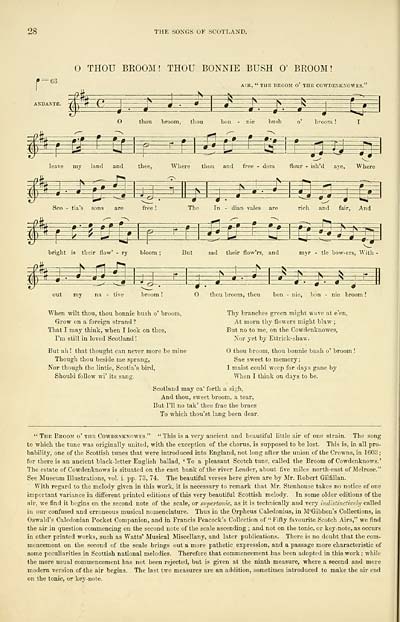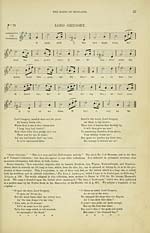Glen Collection of printed music > Printed music > Wood's edition of the songs of Scotland
(52) Page 28 - O thou broom! Thou bonnie bush o' broom
Download files
Complete book:
Individual page:
Thumbnail gallery: Grid view | List view

28
THE SONGS OF SCOTLAND.
' = 63
THOU BKOOM! THOU BONNIE BUSH 0' BROOM!
fltt
\
AIR, " THE BKOOM THE COWDENK.N0WES."
K+rlt
k
1
n
S 1
/iff i »
IN"
N
r
() tt ^
— i '
# •
d
*-. J-. r
- L *
F
-a
•
— «- ^ ■ a
W—
thou broom, thou
bou - nie bush
broom !
a^^g^=s
a
s
-*-?
•-*-
leave my land and thee,
Where thou and free - dom flour - ish'd aye, Where
=*=
^
^
:p=|=
m
s
Sco - tia's sons are
tree !
The
In - dian vales are
rich. and fair, And
E^*3E
r*-r-E
£
s§@
» a ~
-a-ah
bright is tlieir flow' - ry bloom ; But sad their flow'rs, and myr - tie bow-ers, With -
£=fc^
£=£=fc=^
«r>
-a— —
- — a—
out my na - tive
broom !
O thou broom, thou bon - nie, bon - nie broom !
When wilt thou, thou bonnie busli o' broom,
Grow on a foreign strand ?
That I may think, when I look on thee,
I'm still in loved Scotland !
But ah ! that thought can never more be mine
Though thou beside me sprang,
Nor though the Untie, Scotia's bird,
Should follow wi' its sang.
Thy branches green might wave at e'en,
At morn thy flowers might blaw ;
But no to me, on the Cowdenknowes,
Nor yet by Ettrick-shaw.
thou broom, thou bonnie bush o' broom !
Sae sweet to memory ;
1 maist could weep for days gaue by
When I think on days to be.
Scotland may ca' forth a sigh,
And thou, sweet broom, a tear,
But I'll no tak' thee frae the braes
To which thou'st lang been dear.
" The Beoom o' the Cowdenknowes." "This is a very ancient and beautiful little air of one strain. The song
to which the tune was originally united, with the exception of the chorus, is supposed to be lost. This is, in all pro-
bability, one of the Scottish tunes that were introduced into England, not long after the union of the Crowns, in 1 603 ;
for there is an ancient black-letter English ballad, ' To a pleasant Scotch tune, called the Broom of Cowdenknows.'
The estate of Cowdenknows is situated on the east bank of the river Leader, about five miles north-east of Melrose."
See Museum Illustrations, vol. i. pp. 73, 74. The beautiful verses here given are by Mr. Robert Gilfillan.
With regard to the melody given in this work, it is necessary to remark that Mr. Stenhouse takes no notice of one
important variance in different printed editions of this very beautiful Scottish melody. In some older editions of the
air, we find it begins on the second note of the scale, or svpertonic, as it is technically and very indistinctively called
in our confused and erroneous musical nomenclature. Thus in the Orpheus Caledonius, in M'Gibbon's Collections, in
Oswald's Caledonian Pocket Companion, and in Francis Peacock's Collection of "Fifty favourite Scotch Airs," we find
the air in question commencing on the second note of the scale ascending ; and not on the tonic, or key-note, as occurs
in other printed works, such as Watts' Musical Miscellany, and later publications. There is no doubt that the com-
mencement on the second of the scale brings out a more pathetic expression, and a passage more characteristic of
some peculiarities in Scottish national melodies. Therefore that commencement has been adopted in this work ; while
the more usual commencement has not been rejected, but is given at the ninth measure, where a second and more
modern version of the air begins. The last two measures are an addition, sometimes introduced to make the air end
on the tonic, or key-note.
THE SONGS OF SCOTLAND.
' = 63
THOU BKOOM! THOU BONNIE BUSH 0' BROOM!
fltt
\
AIR, " THE BKOOM THE COWDENK.N0WES."
K+rlt
k
1
n
S 1
/iff i »
IN"
N
r
() tt ^
— i '
# •
d
*-. J-. r
- L *
F
-a
•
— «- ^ ■ a
W—
thou broom, thou
bou - nie bush
broom !
a^^g^=s
a
s
-*-?
•-*-
leave my land and thee,
Where thou and free - dom flour - ish'd aye, Where
=*=
^
^
:p=|=
m
s
Sco - tia's sons are
tree !
The
In - dian vales are
rich. and fair, And
E^*3E
r*-r-E
£
s§@
» a ~
-a-ah
bright is tlieir flow' - ry bloom ; But sad their flow'rs, and myr - tie bow-ers, With -
£=fc^
£=£=fc=^
«r>
-a— —
- — a—
out my na - tive
broom !
O thou broom, thou bon - nie, bon - nie broom !
When wilt thou, thou bonnie busli o' broom,
Grow on a foreign strand ?
That I may think, when I look on thee,
I'm still in loved Scotland !
But ah ! that thought can never more be mine
Though thou beside me sprang,
Nor though the Untie, Scotia's bird,
Should follow wi' its sang.
Thy branches green might wave at e'en,
At morn thy flowers might blaw ;
But no to me, on the Cowdenknowes,
Nor yet by Ettrick-shaw.
thou broom, thou bonnie bush o' broom !
Sae sweet to memory ;
1 maist could weep for days gaue by
When I think on days to be.
Scotland may ca' forth a sigh,
And thou, sweet broom, a tear,
But I'll no tak' thee frae the braes
To which thou'st lang been dear.
" The Beoom o' the Cowdenknowes." "This is a very ancient and beautiful little air of one strain. The song
to which the tune was originally united, with the exception of the chorus, is supposed to be lost. This is, in all pro-
bability, one of the Scottish tunes that were introduced into England, not long after the union of the Crowns, in 1 603 ;
for there is an ancient black-letter English ballad, ' To a pleasant Scotch tune, called the Broom of Cowdenknows.'
The estate of Cowdenknows is situated on the east bank of the river Leader, about five miles north-east of Melrose."
See Museum Illustrations, vol. i. pp. 73, 74. The beautiful verses here given are by Mr. Robert Gilfillan.
With regard to the melody given in this work, it is necessary to remark that Mr. Stenhouse takes no notice of one
important variance in different printed editions of this very beautiful Scottish melody. In some older editions of the
air, we find it begins on the second note of the scale, or svpertonic, as it is technically and very indistinctively called
in our confused and erroneous musical nomenclature. Thus in the Orpheus Caledonius, in M'Gibbon's Collections, in
Oswald's Caledonian Pocket Companion, and in Francis Peacock's Collection of "Fifty favourite Scotch Airs," we find
the air in question commencing on the second note of the scale ascending ; and not on the tonic, or key-note, as occurs
in other printed works, such as Watts' Musical Miscellany, and later publications. There is no doubt that the com-
mencement on the second of the scale brings out a more pathetic expression, and a passage more characteristic of
some peculiarities in Scottish national melodies. Therefore that commencement has been adopted in this work ; while
the more usual commencement has not been rejected, but is given at the ninth measure, where a second and more
modern version of the air begins. The last two measures are an addition, sometimes introduced to make the air end
on the tonic, or key-note.
Set display mode to: Large image | Transcription
Images and transcriptions on this page, including medium image downloads, may be used under the Creative Commons Attribution 4.0 International Licence unless otherwise stated. ![]()
| Special collections of printed music > Glen Collection of printed music > Printed music > Wood's edition of the songs of Scotland > (52) Page 28 - O thou broom! Thou bonnie bush o' broom |
|---|
| Permanent URL | https://digital.nls.uk/91338367 |
|---|
| Description | Scottish songs and music of the 18th and early 19th centuries, including music for the Highland bagpipe. These are selected items from the collection of John Glen (1833 to 1904). Also includes a few manuscripts, some treatises, and other books on the subject. |
|---|
| Description | The Glen Collection and the Inglis Collection represent mainly 18th and 19th century Scottish music, including Scottish songs. The collections of Berlioz and Verdi collected by bibliographer Cecil Hopkinson contain contemporary and later editions of the works of the two composers Berlioz and Verdi. |
|---|

